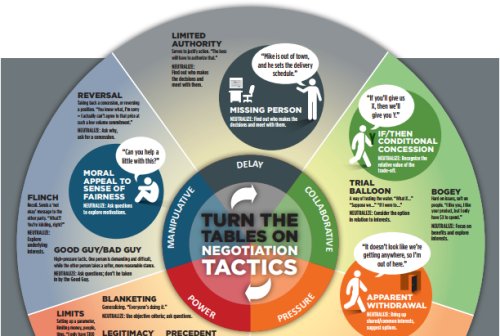Contrary to what some believe, negotiation is not a game. Games have rules whereas negotiation has none... anything can, and often does, happen. Games have procedures, whilst negotiation is often subject to uncertainty and alternatives are frequently proposed and considered.
However, whilst there are no rules in negotiation, there are guidelines that need to be adhered to in order to be an effective negotiator. This article explores these ten key guiding principles.
These are as follows:
1. Effective negotiators know that all offers must be conditional upon the other party giving them something of value in return. They will never give anything away for nothing.
2. They never think on their feet or negotiate 'in the heat of the moment'. Proposals and counter proposals can come quickly, but an effective negotiator will consider, evaluate and reflect on the proposal, taking whatever time is needed, before making a counter proposal of their own.
3. Effective negotiators are capable of strict self-discipline. They remain calm, collected and composed in order to 'keep a clear head'.
4. They spend a considerable amount of time on planning, evaluating and testing their assumptions about the other party.
5. Effective negotiators maintain high aspirations throughout the negotiation. They build upon common ground rather than merely focus on areas of difficulty.
6. They take control of the negotiation before it begins. They take charge of the venue, timing, agenda, and other participants because they know it is more difficult to take control once the negotiation has begun.
7. Effective negotiators continually create room for manoeuvre. This is normally done by opening with an extreme but credible position, and being continually creative with the shape and value of the package.
8. They are rarely the first to move. They do not make an early concession to soften the other party up as they recognise this has the opposite effect and actually toughens up the other party. When they do move, they tend to move fewer times than the other party and in ever decreasing amounts of value (both tangible value and in-tangible value).
9. Effective negotiators get into the head of the other party in order to see the deal from their perspective. This enables them to offer concessions of value and interest to the other party.
10. They keep a close watch on the shape of the package and never forget where the money is. By keeping their ego- and the need to 'win'- in check they are able to both track and maximise the value of the deal.
When negotiating, effective negotiators always challenge any rules, structures, policies, time scales if it is in their interests to do so. They recognise that these tactics are generally used by the other party in an attempt to restrict them and to make them feel uncomfortable. However, effective negotiators are comfortable being uncomfortable!
Above all, effective negotiators recognise that these are guiding principles, not rules. In negotiation, unlike a game, there are no rules.
(c) Gary Gorman, 2008
